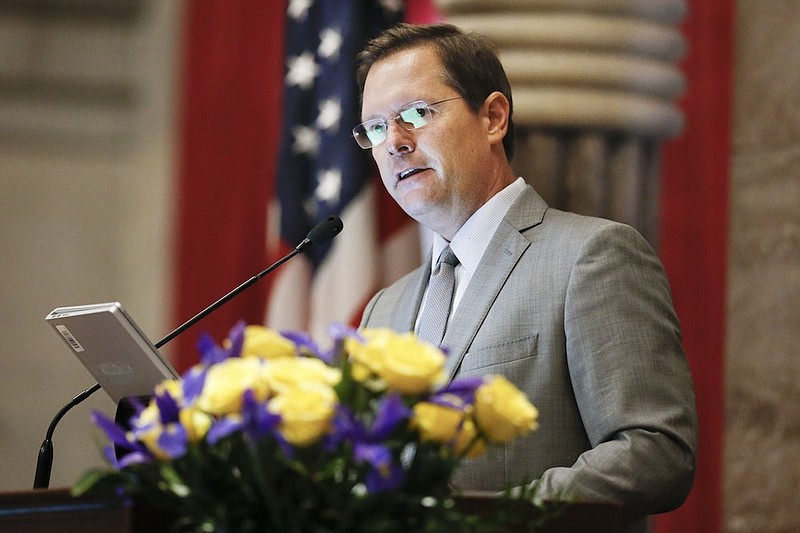NASHVILLE - A "truth in sentencing" bill pressed by Tennessee House Speaker Cameron Sexton would require adults convicted after July 1 on any of 14 specific felony offenses to serve 100% of the sentence with the punishment "undiminished" by any time-reduction credits prisoners earn for good behavior.
It's one of two bills the Crossville Republican has introduced, working with trusted GOP colleagues to carry the legislation. The second is the "Transparency in Sentencing for Victims Act." It requires that when a judge imposes a prison sentence, the court will announce publicly the estimated number of years and months a defendant is expected to serve before becoming eligible for release.
Both bills cleared the House Criminal Justice Subcommittee on Wednesday on voice votes. They are among several bills being pushed by lawmakers to amp up the amount of prison time using existing sentencing ranges.
In a Times Free Press interview in his office later Wednesday, Sexton said the bills are a follow-up to laws last year boosting sentences for crimes singling out women and children.
"This year, we are looking at the violent crimes, and we feel there are certain crimes out there that are so horrific and so violent that those crimes should be 100% of truth in sentencing. What they get is what they serve," Sexton said.
In a case of attempted first degree murder involving serious bodily injury, the average time served currently is 5.72 years, according to figures provided by Sexton's office. Under the truth-in-sentencing bill, a judge or jury would be restricted to using a range of between 15-25 years. Once in prison, the inmate's sentence could not be reduced by the standard sentence time restrictions for good behavior.
The credits can still be applied to increased privileges and a reduced security classification.
The bill is projected to have a $40 million annual cost, according to a Fiscal Review Committee fiscal note.
The second Sexton measure, the sentencing transparency bill, would require judges or juries to announce the expected time to be served. House Judiciary Committee Chairman Michael Curcio, R-Dickson, who is carrying the bill, called it "heartbreaking when a victim learns an offender will serve only a fraction of their sentence before being released. This legislation will prevent that traumatic experience and ensure we have transparency in sentencing. I appreciate Speaker Sexton trusting me to carry this critical legislation."
Truth in sentencing bill
House Bill 2656 is aimed at increasing the length of time served in prisons for these felony crimes:— Aggravated assault.— Vehicular homicide.— Aggravated vehicular homicide.— Possessing a firearm or antique firearm during commission or attempt to commit a dangerous felony.— Attempted first-degree murder, where the victim suffers serious bodily injury.— Aggravated kidnapping.— Especially aggravated kidnapping.— Aggravated robbery.— Especially aggravated robbery.— Carjacking.— Aggravated burglary.— Especially aggravated burglary.— Aggravated arson.— The manufacture, delivery or sale of a controlled substance, where the instant offense is classified as a Class A, B, or C felony and the person has two or more prior convictions for the manufacture, delivery or sale of a controlled substance classified as a Class A, B, or C felony prior to or at the time of committing the instant offense.
The bill has detractors, including Senate Minority Leader Jeff Yarbro, D-Nashville, an attorney.
"For some reason, Tennessee keeps passing criminal justice reform bills that end up with the state spending more money to incarcerate more people for longer periods of time," Yarbro told the Times Free Press at the Cordell State Office Building, "which is just wildly inconsistent with what's happening everywhere else in the country. We have a real problem with violent crime in Tennessee and elsewhere, but we should do things that work and the evidence demonstrates that this 1990s-era policy hasn't been effective.
"I'm like, did I get out of a time-machine Delorean in the mid-90s somewhere?" Yarbro said in an allusion to the movie "Back to the Future." "It's really confusing to me where this is coming from."
Said Rep. Yusuf Hakeem, D-Chattanooga, a former Tennessee Board of Parole member, also questioned how effective the bill would be.
"I'm sure with some citizens, that plays well, but I really question what it does for that person," he said. "It takes away the ability to improve the behavior of that individual and for them to be, hopefully, model citizens with assistance when they come out."
Tori Venable, Tennessee director for the libertarian organization Americans for Prosperity, which has worked on criminal justice reform issues, said there are pitfalls for the legislation.
"Transparency in sentencing is a great thing," Venable said. "But if they get they get the truth in sentencing part wrong, it's going to be really bad for taxpayers."
Contact Andy Sher at asher@timesfreepress.com or 615-255-0550. Follow him on Twitter @AndySher1.
